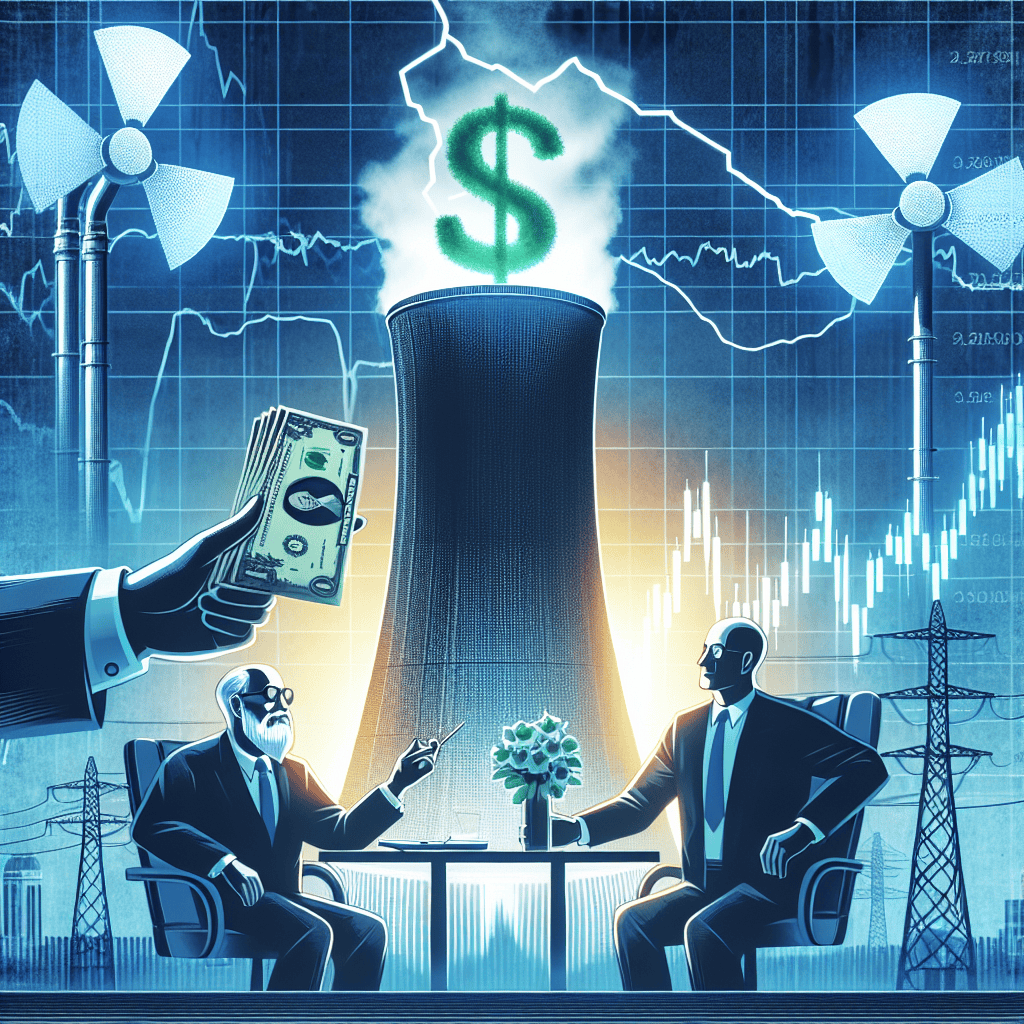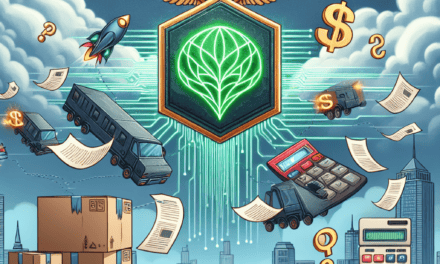“Powering the Future: Is Bill Gates’ Nuclear Investment the Ultimate Stock Opportunity?”
Introduction
Bill Gates’ investment in nuclear power has garnered significant attention as a potential top stock pick in today’s market. As the co-founder of Microsoft and a prominent figure in the tech industry, Gates has long been an advocate for innovative solutions to global challenges, including climate change. His involvement in nuclear energy, particularly through his company TerraPower, highlights a strategic focus on developing advanced nuclear technologies that promise safer, more efficient, and sustainable energy production. With the growing emphasis on clean energy transitions and reducing carbon emissions, Gates’ investment in nuclear power is seen as a forward-thinking move that aligns with global sustainability goals. This has led investors to closely monitor the potential of nuclear power stocks, considering them as viable options for long-term growth and impact in the evolving energy sector.
Bill Gates’ Vision: Transforming Energy with Nuclear Power Investments
Bill Gates, the co-founder of Microsoft and a prominent philanthropist, has long been an advocate for innovative solutions to global challenges. Among his many interests, the pursuit of sustainable energy sources stands out as a critical focus. Gates’ investment in nuclear power, particularly through his company TerraPower, has garnered significant attention in recent years. This raises the question: is his investment in nuclear power the top stock pick today?
To understand the potential of Gates’ investment, it is essential to consider the broader context of the energy sector. As the world grapples with the effects of climate change, the demand for clean and reliable energy sources has never been more urgent. Traditional fossil fuels, while still dominant, are increasingly scrutinized for their environmental impact. In this landscape, nuclear power emerges as a compelling alternative due to its ability to generate large amounts of electricity with minimal carbon emissions.
Gates’ vision for nuclear power is not limited to conventional reactors. TerraPower, founded in 2006, is at the forefront of developing advanced nuclear technologies. One of its most promising projects is the Natrium reactor, a next-generation design that aims to address the limitations of traditional nuclear power plants. The Natrium reactor boasts enhanced safety features, greater efficiency, and the ability to integrate with renewable energy sources, making it a versatile option for the future energy grid.
Moreover, Gates’ investment in nuclear power aligns with global efforts to transition to cleaner energy. Governments worldwide are setting ambitious targets to reduce carbon emissions, and nuclear power is increasingly seen as a viable component of a diversified energy strategy. For instance, the United States and several European countries are revisiting their nuclear policies, recognizing the role that advanced reactors can play in achieving net-zero emissions.
However, investing in nuclear power is not without its challenges. The industry faces significant regulatory hurdles, high initial costs, and public skepticism due to past nuclear accidents. Despite these obstacles, Gates remains optimistic about the potential of nuclear technology to transform the energy landscape. His commitment is evident in TerraPower’s partnerships with major energy companies and government agencies, which aim to accelerate the development and deployment of advanced reactors.
From an investment perspective, Gates’ involvement in nuclear power presents both opportunities and risks. On one hand, the growing emphasis on clean energy and the potential for technological breakthroughs make nuclear power an attractive sector for long-term investors. On the other hand, the industry’s inherent complexities and uncertainties require careful consideration.
In conclusion, while Bill Gates’ investment in nuclear power is undoubtedly significant, whether it is the top stock pick today depends on various factors, including an investor’s risk tolerance and investment horizon. The potential for nuclear power to play a crucial role in the global energy transition is undeniable, and Gates’ vision for advanced reactors could pave the way for a more sustainable future. As the world continues to seek solutions to the pressing challenge of climate change, Gates’ investment in nuclear power represents a bold and forward-thinking approach that could yield substantial rewards for those willing to navigate the complexities of this evolving industry.
The Future of Energy: How Bill Gates is Betting on Nuclear Power
In recent years, the global energy landscape has been undergoing a significant transformation, driven by the urgent need to address climate change and reduce carbon emissions. Amidst this shift, nuclear power has re-emerged as a potential cornerstone of a sustainable energy future. One of the most prominent advocates for this resurgence is Bill Gates, whose investment in nuclear power has sparked considerable interest among investors and environmentalists alike. As the world grapples with the dual challenges of meeting growing energy demands and minimizing environmental impact, Gates’ commitment to nuclear energy raises the question: is this the top stock pick today?
Bill Gates, co-founder of Microsoft and a leading philanthropist, has long been a proponent of innovative solutions to global challenges. His investment in TerraPower, a nuclear innovation company, underscores his belief in the potential of advanced nuclear technologies to provide clean, reliable, and scalable energy. TerraPower is focused on developing next-generation nuclear reactors that promise enhanced safety features, reduced waste, and improved efficiency. These advancements are crucial in addressing the historical concerns associated with nuclear power, such as the risk of accidents and the long-term management of radioactive waste.
Moreover, Gates’ investment aligns with a broader trend of renewed interest in nuclear energy as a viable component of a low-carbon future. As countries strive to meet their climate commitments under the Paris Agreement, nuclear power offers a stable and continuous energy source that complements intermittent renewables like wind and solar. This synergy is particularly important as the world transitions away from fossil fuels, which have been the dominant energy source for decades. By integrating nuclear power into the energy mix, nations can enhance grid stability and reduce reliance on carbon-intensive energy sources.
In addition to its environmental benefits, nuclear power presents a compelling economic opportunity. The development and deployment of advanced nuclear technologies have the potential to create jobs, stimulate economic growth, and foster technological innovation. As governments and private investors increasingly recognize these advantages, the nuclear sector is poised for significant expansion. This potential for growth makes nuclear power an attractive prospect for investors seeking to capitalize on the transition to a sustainable energy future.
However, it is important to acknowledge the challenges that remain in realizing the full potential of nuclear power. Regulatory hurdles, public perception, and the high initial costs of nuclear projects are significant barriers that must be addressed. Nonetheless, the ongoing advancements in reactor design and safety, coupled with increasing political and financial support, suggest that these obstacles are not insurmountable.
In conclusion, Bill Gates’ investment in nuclear power through TerraPower highlights the growing recognition of nuclear energy as a critical component of the future energy landscape. While it may not be the definitive top stock pick for every investor, it represents a strategic bet on the long-term viability of clean and reliable energy. As the world continues to navigate the complexities of the energy transition, the role of nuclear power is likely to expand, offering both environmental and economic benefits. For those willing to embrace the potential of this technology, Gates’ investment serves as a compelling example of how innovation and strategic foresight can drive progress towards a sustainable future.
Analyzing the Impact of Bill Gates’ Nuclear Power Investments on the Stock Market
Bill Gates, co-founder of Microsoft and a prominent philanthropist, has long been an advocate for innovative solutions to global challenges. Among his many ventures, his investment in nuclear power has garnered significant attention, particularly in the context of its potential impact on the stock market. As the world grapples with the dual challenges of climate change and energy security, Gates’ commitment to nuclear energy represents a strategic move that could influence investor sentiment and market dynamics.
Nuclear power, often viewed with skepticism due to historical safety concerns, is experiencing a renaissance as a clean energy source capable of providing reliable and large-scale electricity generation. Gates, through his company TerraPower, is at the forefront of this movement, advocating for advanced nuclear technologies that promise enhanced safety and efficiency. TerraPower’s development of the Natrium reactor, a next-generation nuclear technology, exemplifies this commitment. The Natrium reactor is designed to be safer and more cost-effective than traditional nuclear reactors, addressing some of the key barriers that have hindered the widespread adoption of nuclear energy.
The implications of Gates’ investment in nuclear power extend beyond technological advancements. As TerraPower progresses in its development and deployment of advanced reactors, the company has the potential to influence the stock market significantly. Investors, always on the lookout for the next big opportunity, may view Gates’ involvement as a signal of credibility and potential profitability. This perception could lead to increased interest in companies associated with nuclear technology, driving up stock prices and attracting further investment in the sector.
Moreover, Gates’ investment aligns with broader trends in the energy market. As countries worldwide commit to reducing carbon emissions and transitioning to sustainable energy sources, nuclear power is increasingly seen as a viable option. This shift in perception is reflected in policy changes and government support for nuclear projects, which can further bolster investor confidence. The combination of technological innovation, policy support, and influential backers like Gates creates a favorable environment for nuclear power stocks.
However, it is essential to consider the risks and challenges associated with investing in nuclear power. Despite advancements, nuclear energy projects often face regulatory hurdles, high initial costs, and public opposition. These factors can lead to delays and increased expenses, impacting the financial performance of companies in the sector. Investors must weigh these risks against the potential rewards, considering both the long-term prospects of nuclear power and the specific circumstances of individual companies.
In conclusion, Bill Gates’ investment in nuclear power through TerraPower represents a significant development in the energy sector with potential implications for the stock market. While the promise of advanced nuclear technology is compelling, investors must navigate a complex landscape of opportunities and challenges. Gates’ involvement undoubtedly adds a layer of credibility and interest, but it is crucial for investors to conduct thorough research and consider the broader context of the energy transition. As the world continues to seek sustainable solutions to its energy needs, the role of nuclear power—and the influence of visionary investors like Gates—will remain a topic of keen interest and debate in the financial community.
Why Bill Gates Believes Nuclear Power is the Key to Sustainable Energy

Bill Gates, co-founder of Microsoft and a prominent philanthropist, has long been an advocate for innovative solutions to global challenges. Among his many interests, nuclear power stands out as a key focus in his quest for sustainable energy. Gates’ investment in nuclear power is not merely a financial endeavor but a strategic move aimed at addressing the pressing issue of climate change. As the world grapples with the need to reduce carbon emissions and transition to cleaner energy sources, Gates believes that nuclear power holds the potential to play a pivotal role in this transformation.
One of the primary reasons Gates champions nuclear power is its ability to generate large amounts of electricity without emitting greenhouse gases. Unlike fossil fuels, which release significant amounts of carbon dioxide and other pollutants into the atmosphere, nuclear power plants produce energy through nuclear fission, a process that does not contribute to air pollution. This characteristic makes nuclear energy an attractive option for countries seeking to meet their energy needs while minimizing their environmental impact. Furthermore, nuclear power plants can operate continuously, providing a stable and reliable source of energy that is not subject to the fluctuations experienced by solar and wind power.
In addition to its environmental benefits, Gates sees nuclear power as a means to enhance energy security. Many countries rely heavily on imported fossil fuels, which can be subject to geopolitical tensions and market volatility. By investing in domestic nuclear power infrastructure, nations can reduce their dependence on foreign energy sources and gain greater control over their energy supply. This aspect of energy independence is particularly appealing in an era where energy security is increasingly intertwined with national security.
Moreover, Gates is not just investing in traditional nuclear power technologies but is also supporting the development of advanced nuclear reactors. These next-generation reactors promise to be safer, more efficient, and more cost-effective than their predecessors. For instance, Gates has backed TerraPower, a company focused on developing a new type of reactor known as a traveling wave reactor. This technology aims to utilize depleted uranium, a byproduct of the current nuclear fuel cycle, thereby reducing nuclear waste and making better use of existing resources. Such innovations could address some of the longstanding concerns associated with nuclear power, such as safety risks and waste management.
Despite the potential advantages, nuclear power is not without its challenges. High initial costs, regulatory hurdles, and public perception issues have historically hindered the expansion of nuclear energy. However, Gates remains optimistic that with continued investment and technological advancements, these obstacles can be overcome. He argues that the urgency of the climate crisis necessitates bold action and that nuclear power, with its capacity for large-scale, low-carbon energy production, should be a central component of the global energy strategy.
In conclusion, Bill Gates’ investment in nuclear power reflects his belief in its critical role in achieving a sustainable energy future. By addressing environmental concerns, enhancing energy security, and supporting technological innovation, nuclear power presents a compelling case for consideration as a top stock pick today. As the world continues to seek solutions to the dual challenges of energy demand and climate change, Gates’ vision for nuclear power may well prove to be a key element in the transition to a cleaner, more sustainable energy landscape.
The Role of Innovation in Bill Gates’ Nuclear Power Investment Strategy
Bill Gates, a name synonymous with technological innovation and philanthropy, has turned his attention to the energy sector, specifically nuclear power. His investment strategy in this field is not merely a financial endeavor but a testament to his belief in the transformative potential of innovation. As the world grapples with the dual challenges of climate change and energy security, Gates’ focus on nuclear power underscores the critical role that cutting-edge technology can play in addressing these issues.
At the heart of Gates’ investment strategy is TerraPower, a company he co-founded in 2006. TerraPower aims to revolutionize the nuclear power industry by developing advanced nuclear reactors that are safer, more efficient, and more sustainable than traditional models. The company’s flagship project, the Natrium reactor, exemplifies this innovative approach. By utilizing a combination of liquid sodium and molten salt, the Natrium reactor promises to enhance safety and reduce waste, addressing two of the most significant concerns associated with nuclear energy.
Moreover, Gates’ investment in nuclear power is driven by the urgent need to transition to low-carbon energy sources. As global energy demands continue to rise, the limitations of renewable energy sources such as wind and solar become apparent. While these sources are crucial components of a sustainable energy future, their intermittent nature poses challenges for grid reliability. Nuclear power, with its ability to provide a stable and continuous energy supply, offers a viable solution to complement renewables and ensure a balanced energy mix.
In addition to technological advancements, Gates’ strategy emphasizes the importance of collaboration and partnerships. Recognizing that the challenges of climate change and energy transition are too vast for any single entity to tackle alone, Gates has fostered alliances with governments, research institutions, and private companies. These collaborations aim to accelerate the development and deployment of advanced nuclear technologies, thereby reducing costs and overcoming regulatory hurdles.
Furthermore, Gates’ investment in nuclear power is not solely about technological innovation; it also reflects a broader vision of economic and social impact. By investing in nuclear power, Gates seeks to create jobs, stimulate economic growth, and enhance energy security. In regions where energy access is limited, advanced nuclear technologies have the potential to provide reliable and affordable electricity, thereby improving living standards and fostering economic development.
However, it is essential to acknowledge the challenges and criticisms associated with nuclear power. Concerns about safety, waste management, and public perception continue to pose significant obstacles. Gates’ strategy addresses these issues by prioritizing transparency, rigorous safety standards, and public engagement. By fostering an open dialogue and addressing concerns head-on, Gates aims to build public trust and support for nuclear power as a critical component of the global energy transition.
In conclusion, Bill Gates’ investment in nuclear power is a compelling example of how innovation can drive meaningful change in the energy sector. By leveraging advanced technologies, fostering collaboration, and addressing economic and social challenges, Gates’ strategy offers a blueprint for a sustainable and secure energy future. While the path forward is not without challenges, the potential benefits of advanced nuclear power make it a promising area for investment and a critical component of the global effort to combat climate change. As such, Gates’ investment in nuclear power may indeed be one of the top stock picks today, reflecting both a commitment to innovation and a vision for a sustainable future.
Comparing Bill Gates’ Nuclear Power Investments to Other Energy Stocks
Bill Gates, a name synonymous with technological innovation and philanthropy, has increasingly turned his attention to the energy sector, particularly nuclear power. His investment in TerraPower, a company focused on developing advanced nuclear reactors, has sparked considerable interest among investors and analysts alike. As the world grapples with the dual challenges of climate change and energy security, Gates’ commitment to nuclear power raises the question: is this the top stock pick today compared to other energy stocks?
To begin with, it is essential to understand the rationale behind Gates’ investment in nuclear power. Nuclear energy offers a low-carbon alternative to fossil fuels, providing a reliable and consistent power supply. Unlike solar and wind energy, which are intermittent and dependent on weather conditions, nuclear power plants can operate continuously, making them a crucial component of a balanced energy portfolio. Gates’ TerraPower aims to revolutionize the nuclear industry by developing next-generation reactors that are safer, more efficient, and capable of utilizing spent nuclear fuel, thereby addressing some of the longstanding concerns associated with nuclear energy.
In contrast, other energy stocks, particularly those in the renewable sector, have also gained significant traction. Companies involved in solar, wind, and battery storage technologies have seen substantial growth as governments worldwide push for cleaner energy solutions. The global shift towards renewable energy is driven by policy incentives, technological advancements, and increasing public awareness of environmental issues. Consequently, these stocks have become attractive to investors seeking to capitalize on the transition to a sustainable energy future.
However, while renewable energy stocks have shown impressive growth, they are not without challenges. The intermittent nature of solar and wind power necessitates the development of efficient energy storage solutions, which are still in the nascent stages. Additionally, the renewable sector is highly competitive, with numerous players vying for market share, which can lead to volatility in stock performance.
On the other hand, nuclear power, despite its potential, faces its own set of hurdles. Public perception of nuclear energy remains a significant barrier, largely due to historical accidents and concerns over radioactive waste management. Regulatory challenges and high initial capital costs also pose obstacles to the widespread adoption of nuclear technology. Nevertheless, advancements in reactor design and increased focus on safety and waste reduction are gradually changing the narrative around nuclear power.
When comparing Gates’ investment in nuclear power to other energy stocks, it is crucial to consider the long-term potential and the role each energy source will play in the future energy landscape. Nuclear power, with its ability to provide a stable and low-carbon energy supply, could complement the growth of renewables, offering a more comprehensive solution to global energy needs. As such, Gates’ investment in TerraPower may appeal to investors with a long-term perspective, who are willing to navigate the complexities and uncertainties associated with the nuclear sector.
In conclusion, while Bill Gates’ investment in nuclear power presents a compelling case for consideration as a top stock pick, it is essential to weigh it against the broader energy market dynamics. The decision ultimately hinges on an investor’s risk tolerance, investment horizon, and belief in the transformative potential of nuclear technology. As the world continues to seek sustainable and reliable energy solutions, both nuclear and renewable energy stocks will likely play pivotal roles in shaping the future of the energy industry.
The Potential Risks and Rewards of Investing in Nuclear Power with Bill Gates
Bill Gates, a name synonymous with technological innovation and philanthropy, has recently turned his attention to the nuclear power sector, sparking considerable interest among investors. His investment in TerraPower, a company focused on developing advanced nuclear reactors, has raised questions about whether nuclear power could be the top stock pick today. As with any investment, there are potential risks and rewards that must be carefully considered.
To begin with, the potential rewards of investing in nuclear power are significant. Nuclear energy is often touted as a clean and efficient alternative to fossil fuels, capable of providing a stable and reliable energy supply with minimal carbon emissions. This aligns with the global push towards sustainable energy solutions, as countries strive to meet ambitious climate goals. Bill Gates’ involvement in TerraPower underscores the potential for innovation in this sector, as the company aims to develop next-generation reactors that are safer and more efficient than traditional models. If successful, these advancements could revolutionize the energy industry, offering substantial returns for early investors.
Moreover, Gates’ investment in nuclear power is not just a financial endeavor but also a strategic move to address the pressing issue of climate change. By leveraging his influence and resources, Gates is advocating for a diversified energy portfolio that includes nuclear power as a key component. This endorsement from a high-profile figure adds credibility to the sector, potentially attracting more investors and driving further research and development. As a result, those who invest in nuclear power today may benefit from the sector’s growth and the increasing demand for clean energy solutions.
However, it is crucial to acknowledge the risks associated with investing in nuclear power. Despite its potential, the industry faces significant challenges, including regulatory hurdles, public perception, and high initial costs. Nuclear power plants require substantial capital investment and lengthy construction timelines, which can deter investors seeking quick returns. Additionally, the industry must navigate complex regulatory environments, as safety concerns and environmental considerations remain paramount. Any misstep in these areas could lead to costly delays or even project cancellations, impacting the financial viability of investments.
Furthermore, public perception of nuclear power remains a contentious issue. High-profile incidents, such as the Fukushima disaster, have left a lasting impression on the public consciousness, leading to skepticism and opposition to nuclear energy. This negative perception can influence policy decisions and hinder the industry’s growth, posing a risk to investors. Therefore, it is essential for companies like TerraPower to prioritize safety and transparency to build public trust and secure the necessary support for their projects.
In conclusion, while Bill Gates’ investment in nuclear power presents an intriguing opportunity, it is not without its challenges. The potential rewards of investing in this sector are substantial, particularly as the world seeks sustainable energy solutions. However, investors must carefully weigh these rewards against the inherent risks, including regulatory challenges, public perception, and high initial costs. As with any investment, due diligence and a thorough understanding of the industry are crucial. Ultimately, whether nuclear power becomes the top stock pick today will depend on the sector’s ability to overcome these obstacles and deliver on its promise of clean, efficient energy.
Q&A
1. **What is Bill Gates’ involvement in nuclear power?**
Bill Gates is a co-founder of TerraPower, a company focused on developing advanced nuclear reactors.
2. **What type of nuclear technology is TerraPower developing?**
TerraPower is working on next-generation nuclear reactors, including the Natrium reactor, which uses liquid sodium as a coolant.
3. **Why is nuclear power considered a potential investment opportunity?**
Nuclear power is seen as a clean energy source that can help reduce carbon emissions and provide reliable energy.
4. **What are the risks associated with investing in nuclear power?**
Risks include regulatory challenges, high initial costs, public perception issues, and technological hurdles.
5. **How does TerraPower plan to address nuclear waste concerns?**
TerraPower aims to use advanced reactor designs that produce less waste and can potentially use existing nuclear waste as fuel.
6. **Is TerraPower publicly traded?**
As of now, TerraPower is not a publicly traded company, so direct investment in it is not possible through the stock market.
7. **What factors should investors consider when looking at nuclear power stocks?**
Investors should consider the regulatory environment, technological advancements, company financials, and the overall energy market trends.
Conclusion
Bill Gates’ investment in nuclear power, particularly through his company TerraPower, highlights the growing interest in advanced nuclear technologies as a potential solution for clean and sustainable energy. While nuclear power offers significant advantages, such as low carbon emissions and high energy output, it also faces challenges like regulatory hurdles, high initial costs, and public perception issues. As a top stock pick, investing in nuclear power involves weighing these factors against the potential for long-term growth and impact on the energy sector. Investors should consider the broader market trends, technological advancements, and policy developments when evaluating the potential of nuclear power investments.




